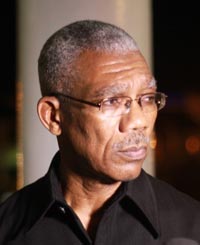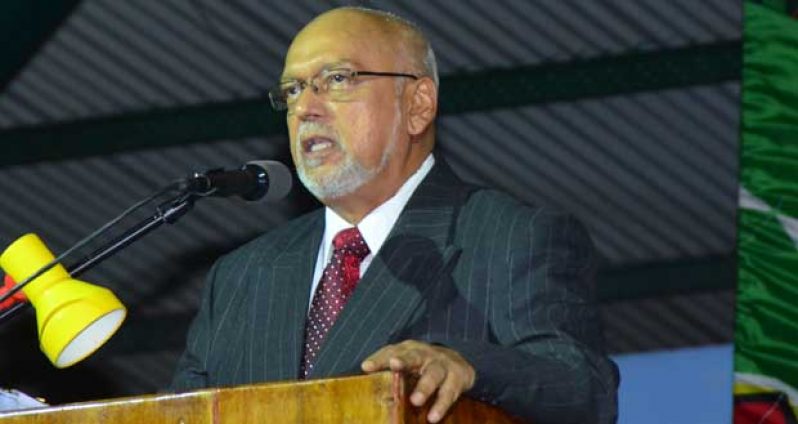-Gov’t policies, programmes improving livelihoods
EACH one of the current administration’s policies and programmes have central to it, a focus on eliminating poverty and improving the standard of living for the Guyanese people.

This was according to President Donald Ramotar, when asked to respond to comments made by Leader of the Opposition and People’s National Congress Reform (PNCR), Brigadier (rtd.) David Granger, at the party’s 18th Biennial Congress.
“Guyana is facing a human development crisis as a result of the PPPC’s chronic maladministration.
PPPC’s mismanagement of public health, public security, public works and public schools.
Guyana, in the new millennium, has become more unsafe and more unstable than ever before, owing to the high rate of crime and the low quality of life,” Granger said.
The Head of State dismissed these comments, noting that the Opposition Leader was clearly pandering to a partisan crowd.
“Where are the facts relating to what he is saying?” Mr. Ramotar questioned.
LOOK AT THE FACTS
He added that major institutions like the World Bank, and more recently the United Nations Development Programme (UNDP), which produced the 2014 Human Development Report (HDR), have pronounced on Guyana’s progress under consecutive People’s Progressive Party (PPP) Governments.
The HDI is a summary measure for assessing long-term progress in three basic dimensions of human development: a long and healthy life, access to knowledge, and a decent standard of living.
According to the report, Guyana has been on a trajectory of steady improvement in the areas reviewed by the UNDP. Between 1980 and 2013, Guyana’s HDI value increased from 0.516 to 0.638, an increase of 23.6 per cent or an average annual increase of about 0.65 per cent.
“There are more possibilities. Guyanese have a choice of more and more possibilities and we are working to broaden the possibilities we are offering our people.” – President Donald Ramotar
“A look at the figures will tell what the real story is. Take for example poverty; when we came into Government, poverty was over 80 per cent, now it is slightly over 14 per cent. This is what we call progress. We are actually bringing up the standard of living,” the President said.
Between 1980 and 2013, Guyana’s life expectancy at birth increased by 5.7 years; the mean years of schooling increased by 2.7 years and expected years of schooling increased by one year. Guyana’s Gross National Income (GNI) per capita increased by about 173.9 per cent between 1980 and 2013.
The report which presented the HDI (values and ranks) for 187 countries and UN-recognised territories also includes the Inequality-adjusted HDI for 145 countries, the Gender Development Index for 148 countries, the Gender Inequality Index for 149 countries, and the Multidimensional Poverty Index for 91 countries.
It also revealed that Guyana is currently listed at 121 out of a total of 187 countries and territories. The position of this country is also shared by Vietnam, and is considered a medium human development category on the international stage.
Guyana’s 2013 HDI of 0.638 is above the average of 0.614 for countries in the medium human development group.
INCREASING POSSIBILITIES
The Head of State stressed that his Government is currently moving to increase the “possibilities” for improved livelihoods for all Guyanese.
He referenced support for: education, through the $10,000 grant, school uniforms and loans for University of Guyana (UG) students; and housing, through reduced interest rates and considerations for low income earners, among the many ongoing initiatives.
Mr. Ramotar also pointed to a menu of measures introduced in this year’s national budget as evidence of consistent efforts to continue to improve the lives of the Guyanese people, as the country’s economic performance improves.
This year no new taxes were introduced; old age pensions would be increased from $12,500 to $13,600 – up from $3,500 in 2006; old age pensioners would receive an annual electricity assistance of $30,000, an increase from $20,000;
Among other measures announced were-the allocation of $3.2B to meet the cost of maintaining the electricity subsidy in Linden and Kwakwani, Region 10 (Upper Demerara/Upper Berbice) the allocation of $100M to advance technical and other assessments for capital works to Port Georgetown; and $1B for rehabilitation of critical interior roads, including the Linden to Lethem road.
Allocations to other major sectors saw an increase in this year’s National Budget and include: $3.7B to the Guyana Power and Light Company, to support critical capital expenditure and avoid increased tariffs for consumers; $1B for rural enterprise development; $6B for the sugar sector, to achieve a badly needed reversal of fortunes; an injection of $500M into the rice sector to support efforts to increase competitiveness and resilience; $200M for advancement of efforts in other agricultural areas; and an investment of $800M into the tourism industry for the establishment of a Hospitality Institute.
“There are more possibilities. Guyanese have a choice of more and more possibilities and we are working to broaden the possibilities we are offering our people,” the President concluded.
(By Vanessa Narine)




.png)









